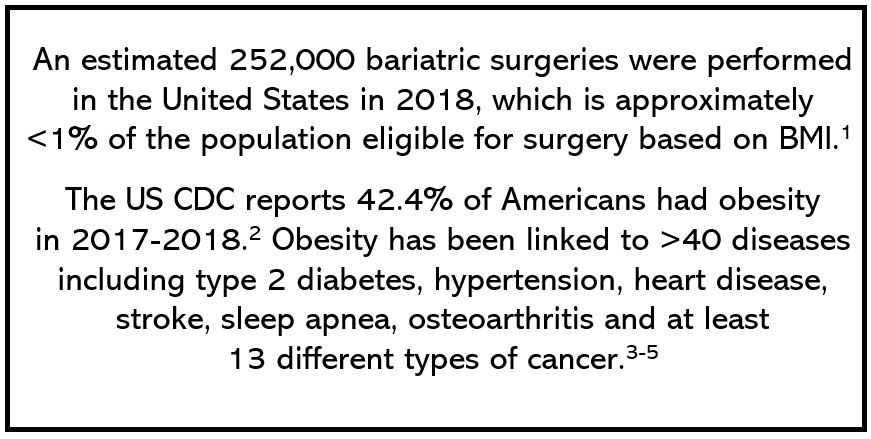Bariatric and metabolic surgery should be resumed, safely and rapidly, a long with other surgeries postponed and deemed “elective” during the COVID-19 pandemic, according to a statement from the American Society for Metabolic and Bariatric Surgery (ASMBS).
Bariatric and metabolic surgery, according to the ASMBS, is "medically necessary and the best treatment for those with the life-threatening and life-limiting disease of severe obesity."
In the position statement, entitled, "Safer Through Surgery," published online in the journal SOARD, the ASMBS strongly rejects use of the description “elective,” stating that metabolic and bariatric surgery are better defined as “medically necessary time-sensitive” or “medically necessary, non-emergent” surgery, both terms better characterizing the procedures’ effectiveness and the progressive nature of the many diseases it treats including obesity, type 2 diabetes, hypertension, and heart disease.
"Elective" is the wrong word
The definition of elective in the Merriam-Webster dictionary is “relating to, being, or involving a nonemergency medical procedure and especially surgery that is planned in advance and is not essential to the survival of the patient.”
Metabolic and bariatric surgery is life-saving surgery, with multiple studies confirming the survival benefit for patients treated by surgery over those treated without surgery. Metabolic and bariatric surgery creates long-term changes in metabolism and reduces or eliminates multiple serious obesity-related diseases improving long-term health and quality of life as well as survival.
Listed with cosmetic plastic surgery
In the statement ASMBS asserts that bariatric and metabolic surgery have been deemed by many, along with cosmetic plastic surgery, as "clear-cut examples of elective procedures that must be postponed during COVID-19." Some state-wide orders include the procedures as examples of elective surgeries that should be among the last to be resumed.
"COVID-19 may be a factor for quite some time and the longer the treatment of obesity, type 2 diabetes, and other related diseases are postponed, the greater the chance they will become worse," said Matthew M. Hutter, MD, MPH, president of the ASMBS and professor of surgery at Harvard Medical School.
"Each state, doctor and patient must make a decision as to when conditions for metabolic and bariatric surgery are right, but the sooner it can be safely performed, the more quickly obesity, type 2 diabetes and other diseases can be reduced or resolved."
Decisions on timing for surgery should factor in a patient’s health status, the local COVID-19 prevalence, and availability of healthcare resources including hospital beds, ventilators, and PPE.
Obesity has been identified as an independent risk factor
for adverse outcomes including death among COVID-19 patients.
The ASMBS statement concludes, "Before COVID-19 began, it was clear that patients with obesity were ‘safer through surgery.’ In the era of COVID-19, ‘safer through surgery’ for patients with obesity may prove to be even more important than before."
Metabolic/bariatric surgery has been shown to be the most effective and long-lasting treatment for severe obesity. Its safety profile is comparable to some of the safest and most commonly performed surgeries in the US including gallbladder surgery, appendectomy and knee replacement.
References
1. https://asmbs.org/resources/estimate-of-bariatric-surgery-numbers
2. https://www.cdc.gov/obesity/data/adult.html
3. The effectiveness and risks of bariatric surgery: an updated systematic review and meta-analysis, 2003-2012. Accessed from: https://jamanetwork.com/journals/jamasurgery/fullarticle/1790378
4. Steele CB, Thomas CC, Henley SJ, et al. Vital Signs: Trends in incidence of cancers associated with overweight and obesity. — United States, 2005-2014. MMWR Morb Mortal Wkly Rep. 2017;66:1052-1058. DOI: http://dx.doi.org/10.15585/mmwr.mm6639e1
5. Centers for Disease Control and Prevention. (2015) The Health Effects of Overweight and Obesity. Accessed from: https://www.cdc.gov/healthyweight/effects/index.html

